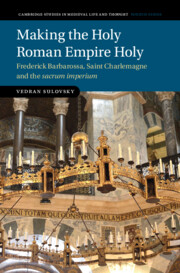 Making the Holy Roman Empire Holy
Making the Holy Roman Empire Holy Published online by Cambridge University Press: 16 May 2024
The introduction explains the state of the scholarship regarding the sanctity of the state, starting with what is commonly believed. Sulovsky then traces the argument back to its intellectual roots, in the process showing that it is based on false premises that had more to do with the clash of Catholic and Protestant worldviews than with any medieval reality per se. The introduction of the phrase sacrum imperium, the translation of the Three Kings and the canonisation of Saint Charlemagne constituting a triad of sacralising acts is traced to Heinrich Appelt, the senior diplomatist who edited Frederick I’s diplomata. However, as Sulovsky shows, Appelt drew heavily upon Friedrich Heer, whose magnum opus Die Tragödie des Heiligen Reiches deeply influenced many scholars, though he is only reluctantly cited by them. Heer’s work is then shown to be a Catholic response to the Kulturkampf-dominated Prussian school, which formulated the original idea of the sacralisation of the state in 1910, but based on eighteenth-century German Protestant interpretations of imperial history. Thus, the introduction demonstrates that much of our knowledge rests on the presuppositions and axioms of a bygone ideological struggle.
To save this book to your Kindle, first ensure [email protected] is added to your Approved Personal Document E-mail List under your Personal Document Settings on the Manage Your Content and Devices page of your Amazon account. Then enter the ‘name’ part of your Kindle email address below. Find out more about saving to your Kindle.
Note you can select to save to either the @free.kindle.com or @kindle.com variations. ‘@free.kindle.com’ emails are free but can only be saved to your device when it is connected to wi-fi. ‘@kindle.com’ emails can be delivered even when you are not connected to wi-fi, but note that service fees apply.
Find out more about the Kindle Personal Document Service.
To save content items to your account, please confirm that you agree to abide by our usage policies. If this is the first time you use this feature, you will be asked to authorise Cambridge Core to connect with your account. Find out more about saving content to Dropbox.
To save content items to your account, please confirm that you agree to abide by our usage policies. If this is the first time you use this feature, you will be asked to authorise Cambridge Core to connect with your account. Find out more about saving content to Google Drive.